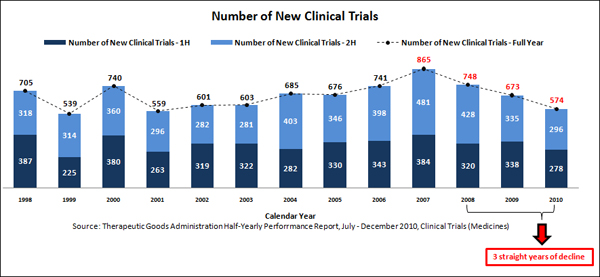Further delay for PBS medicines hurts patients
The Government’s decision to list the Prevenar 13 catch-up vaccine on the Pharmaceutical Benefits Scheme is welcome, but Australian consumers are entitled to be extremely disappointed that the Government continues to delay the listing of seven other medicines.
Prevenar 13 was one of eight medicines and vaccines recommended for listing by the Pharmaceutical Benefits Advisory Committee in November 2010 but blocked by Cabinet in February 2011. These medicines are still not available to the patients who need them.
“I would have hoped that the Government would have used the Budget to announce the listing of these medicines that have been delayed by Cabinet,” Dr Shaw said tonight.
“Australia should not be a country that can’t afford to provide medicines for sick people who need them.
“The Government is penny pinching to get a Budget surplus and they’re using patients’ medicines to do it.
“This decision by Cabinet will mean many patients can’t afford the medicines they need. It puts medicines out of reach for many ordinary Australians.
“The Government’s own expert committee has said making these medicines available is cost effective, value for money and the right thing to do.
“It’s unclear what expertise or experience Cabinet Ministers have at their disposal to override the decisions of their own expert committee.
“It’s ironic that the Government is investing in additional cost-effectiveness analysis of new medicines by the PBAC when Cabinet is not accepting its recommendations.”
Dr Shaw said Cabinet’s delay in listing new PBS medicines undermined business certainty for Australia’s leading manufactured export industry.
“The Australian Medicines Industry makes a significant contribution to the economy. We produce more than $4 billion a year in export earnings, but business confidence is being eroded by ongoing uncertainty stemming from Cabinet’s intervention.
“I am aware of a couple of companies who have already hit the pause button in terms of bringing new products to Australia, until they see evidence of greater policy stability.
“I urge the Cabinet to reverse its decision as soon as possible.”
The MoU between Medicines Australia and the Commonwealth meant there were no PBS savings related measures in the Budget.
–ENDS–
Contact Person:
Jamie Nicholson
Media Communications Manager
Phone: 0419 220 293
Email: Jamie.Nicholson@medicinesaustralia.com.au

